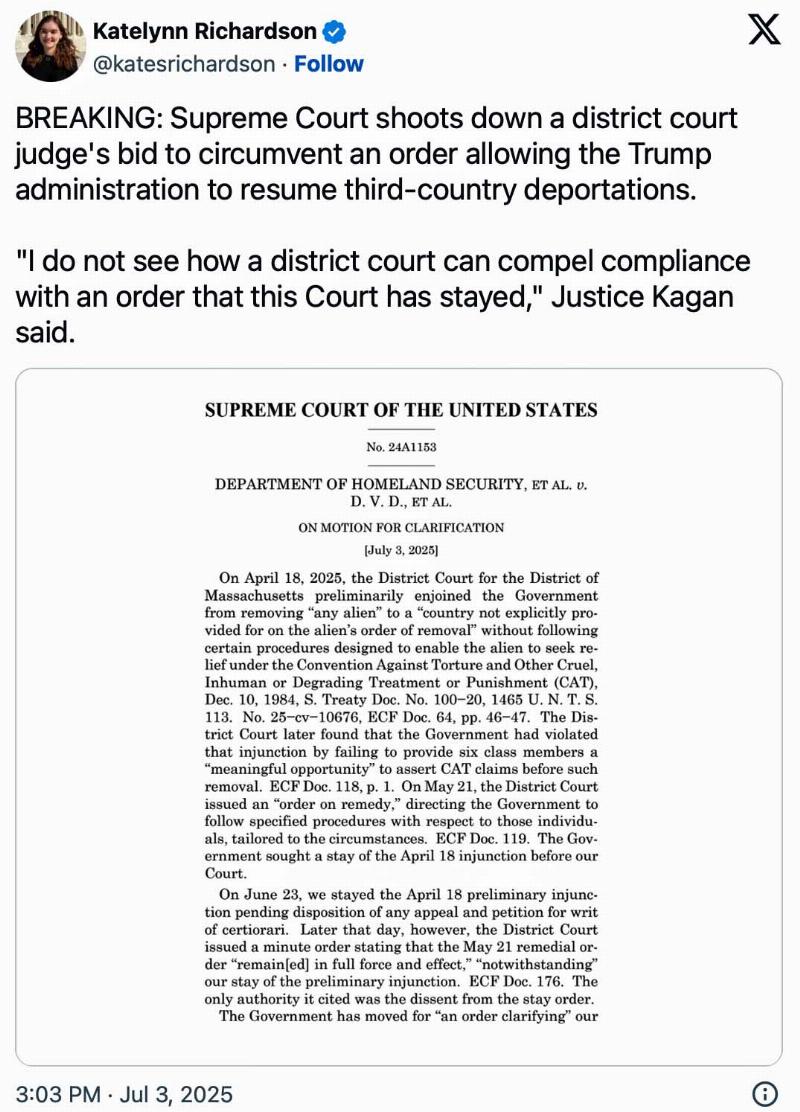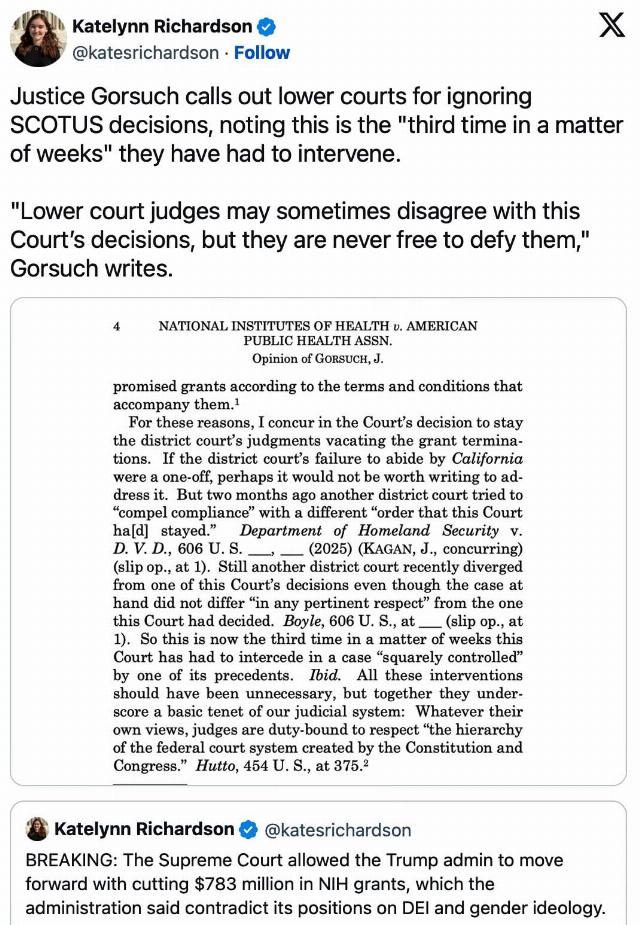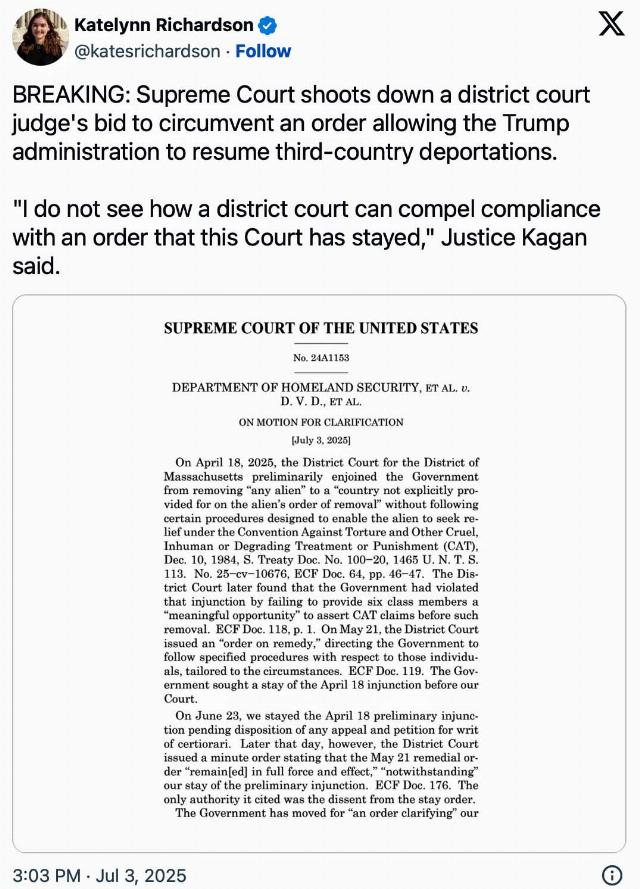


The Supreme Court is the only court established by the Constitution in Article III, Section 1:
The judicial Power of the United States, shall be vested in one supreme Court, and in such inferior Courts as the Congress may from time to time ordain and establish.
Every inferior court is the invention of Congress, which has the power to regulate them. Recent inferior court lawfare against President Trump, and even the Supreme Court, has revealed neither the Supreme Court nor the Congress seem to be in any hurry to exercise their respective powers, though the Supreme Court is firing some warning shots across the lower court’s bows.
Justice Neil Gorsuch issued a pointed warning criticizing lower courts for repeatedly defying Supreme Court decisions in cases involving the Trump administration.
Gorsuch, writing in an opinion joined by Justice Brett Kavanaugh, said the Court’s decision allowing the administration to move forward with cutting millions in National Institutes of Health (NIH) grants was the “third time in a matter of weeks” that the justices had to overturn a lower court on an issue it had already addressed.
“Lower court judges may sometimes disagree with this Court’s decisions, but they are never free to defy them,” Gorsuch wrote.
The case before the Court involved the Trump administration’s decision to terminate NIH grants tied to diversity, equity and inclusion (DEI) and gender ideology-related programs.
The Court upheld, in April, the Executive’s power to cut off DEI teaching grants, but a district court, citing dissenting opinions and a failed appellate ruling, let a similar challenge continue, ignoring the Court’s clear ruling in intent and text. Justice Gorsuch was not amused:
“If nothing else, the promise of our legal system that like cases are treated alike means that a lower court ought not invoke the ‘persuasive authority’ of a dissent or a repudiated court of appeals decision to reach a different conclusion on an equivalent record,” he wrote.
Gorsuch also referred to two additional lawfare attempts to ignore the Supreme Court:

Graphic: X Post
When a district court judge ignored the Supreme Court again to try to keep illegal aliens in America, even leftist Justice Elena Kagan joined the 7-2 majority to uphold the Court’s authority:

Graphic: X Post
Another district court judge ignored the Court’s ruling affirming President Trump's power to remove three Democrat members of the Consumer Product Safety Commission.
In its order regarding the CPSC case, the Court reiterated that emergency docket decisions are “not conclusive as to the merits” but must guide how lower courts handle similar disputes.
Gorsuch wrote that the repeated need for the justices to intervene underscored a fundamental rule of the judiciary.
“All these interventions should have been unnecessary, but together they underscore a basic tenet of our judicial system: Whatever their own views, judges are duty-bound to respect ‘the hierarchy of the federal court system created by the Constitution and Congress,’” he said.
Democrats expel a great deal of hot air claiming Trump is violating norms and destroying the Constitution and rule of law. They whine: “no one is above the law.” In maintaining a judicial resistance against not only the legitimate powers of the Executive and against the Supreme Court, Democrat inferior court judges are engaging in projection. But unlike Trump, their projection and resistance are striking at the heart of our system of ordered justice.
In an almost certainly apocryphal quote, Andrew Jackson supposedly said: “John Marshall has made his decision, now let him enforce it!” Even so, the sentiment illustrates our current problem. The Supreme Court’s power comes from the Constitution, but compliance with Supreme Court orders is essentially voluntary if Congress is unwilling to act to rein in the inferior courts.
Our constitutional, representative republic stands only so long as Americans willingly honor the Constitution and the lawful decisions of the courts, particularly including the Supreme Court, the only court created by the Constitution. Democrats don’t honor the Constitution and virtually always speak of “our democracy,” the tyranny of the majority they hope to create on the path to a permanent, one-party state. Their court-packing intention also demonstrates their constant lack of respect for the Constitution when it gets in the way of their mania for ultimate political power.
Will Congress act, while Republicans have the power to act, to keep our representative republic and prevent disunion or civil war? We’ll soon find out.
Become a subscriber and get our weekly, Friday newsletter with unique content from our editors. These essays alone are worth the cost of the subscription.
Mike McDaniel is a USAF veteran, classically trained musician, Japanese and European fencer, life-long athlete, firearm instructor, retired police officer and high school and college English teacher. He is a published author and blogger. His home blog is Stately McDaniel Manor.
